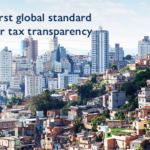
A new GRI research paper, Corporate lobbying impacts: stakeholder demands for transparency, highlights growing concerns over transparency and accountability in corporate lobbying – a routine aspect of how companies engage with governments.
Globally, the scale of lobbying is significant. In the United States alone, lobbying expenditures reached $5.6 billion in 2023. The practice is often driven by an intent from companies and organizations to secure competitive advantages, reduce tax burdens or shape regulations in line with their business priorities.
The new publication from GRI, the provider of the world’s most widely used sustainability reporting standards, highlights growing scrutiny on whether lobbying efforts align with public interests and sustainability commitments. It highlights risks such as regulatory stagnation, delays in addressing global challenges like climate change, and policy decisions being directed away from the public interest.
With practical suggestions to improve transparency and accountability in lobbying activities, the paper recommends that organizations:
-
- Go beyond legal compliance and voluntarily disclose lobbying activities;
-
- Centralize disclosures in a single, easily accessible location;
-
- Conduct regular reviews of trade association memberships;
-
- Establish board-level oversight of political engagement.
Miguel Pérez Ludeña, Research Lead at GRI, said: “Supporting organizations to demonstrate transparency and deepen accountability for their impacts is a central pillar of the GRI Standards. Stakeholders need to know how organizations are influencing policy development, especially when these activities have direct implications for environmental, social and economic sustainability. Through our new research, we provide a comprehensive analysis of lobbying practices and their implications, underscoring the imperative for responsible corporate engagement in public policy.”
Many countries lack clear lobbying disclosure rules, and where they do exist, reports often fail to show which positions companies support or oppose. Varying definitions of lobbying across jurisdictions further impact what is reported, raising doubts about whether current practices meet stakeholder expectations.
The research paper included insights from a wide range of civil society organizations and think tanks active in this field – whose input informed a series of recommendations for companies, such as:
- Broaden definitions of lobbying that include indirect influence, such as trade associations and public relations campaigns.
- Provide detailed reporting on lobbying expenditures, specific policy positions, and advocacy outcomes.
- Ensure public disclosure of trade association memberships and actions taken to address any misalignments with corporate policies.
- Include assurance on whether lobbying activities align with stated climate and sustainability commitments.



